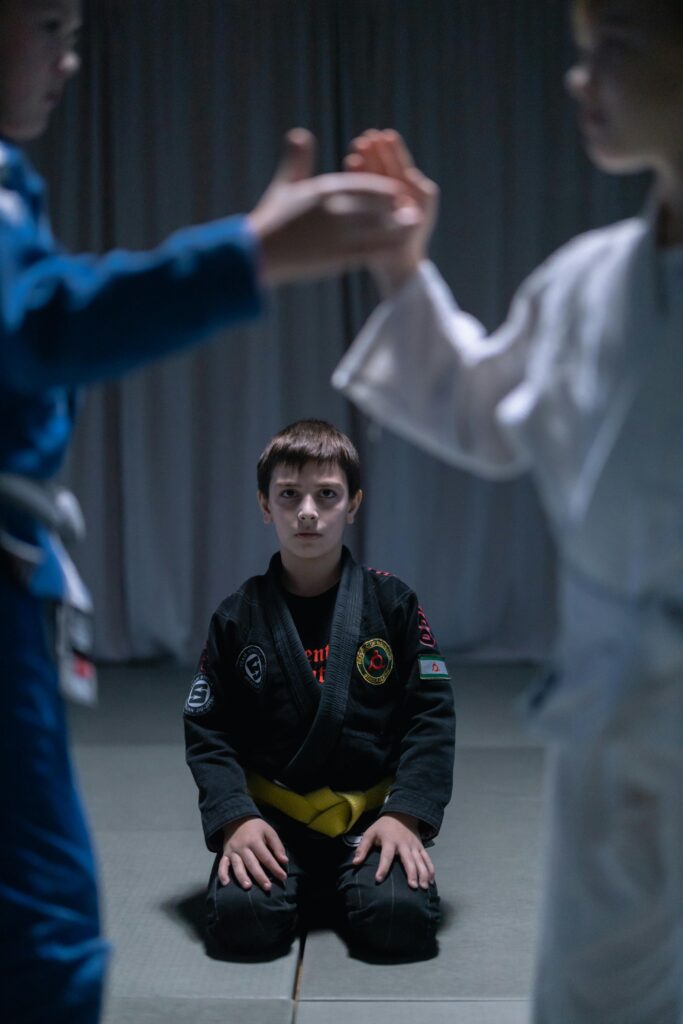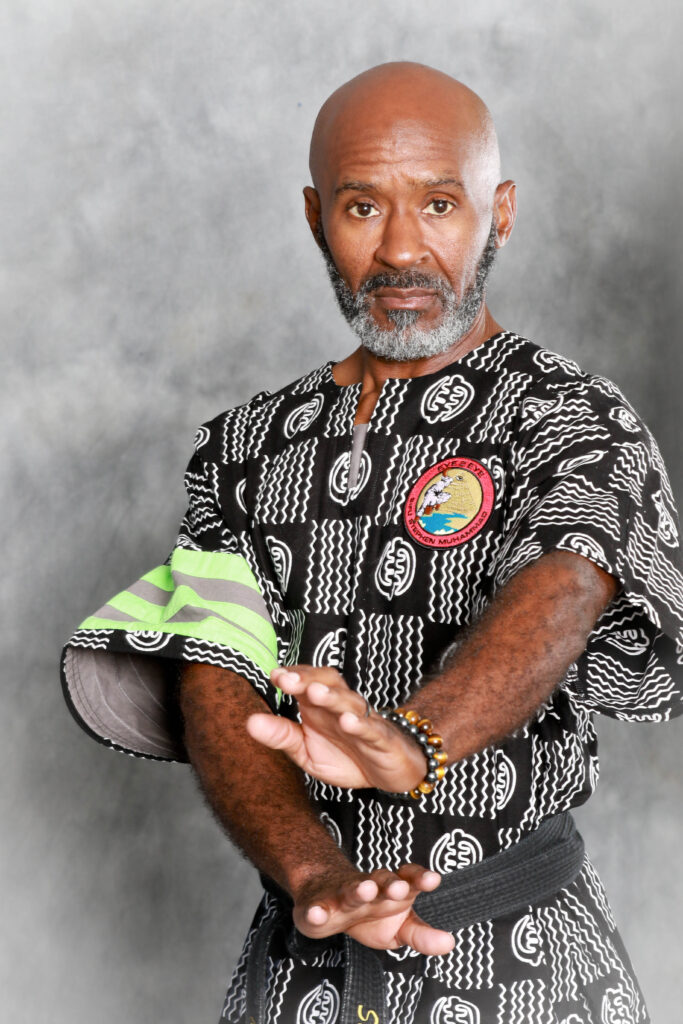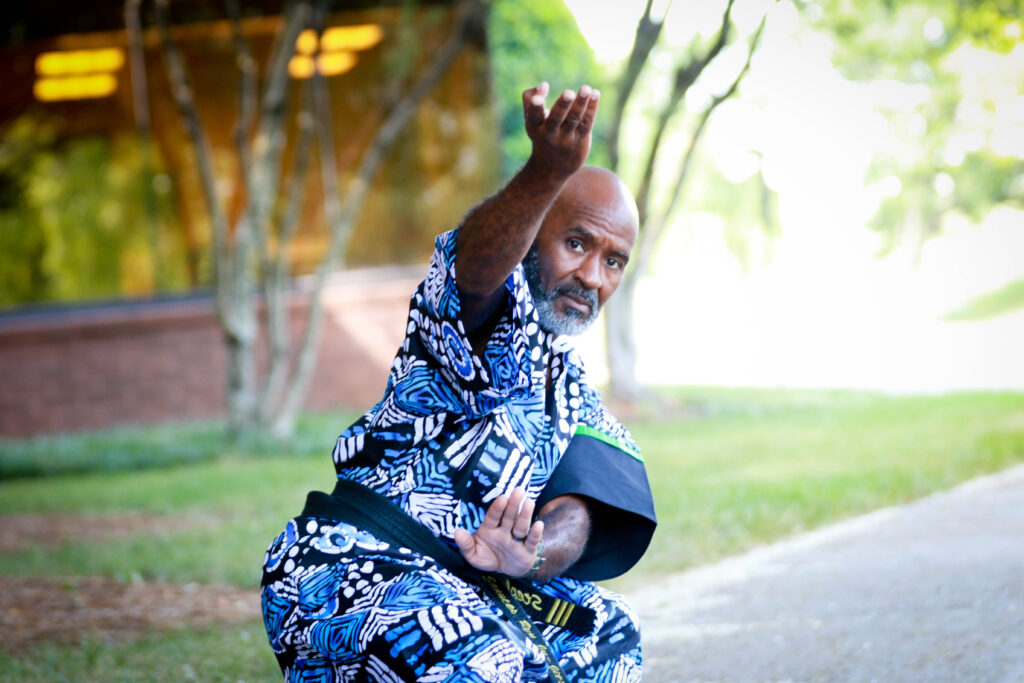Your ability to defend yourself isn’t limited to physical strength or knowing a few techniques. It’s deeply tied to emotional intelligence—the way you understand, manage, and respond to emotions in high-stakes situations.
Being able to stay calm, read the emotions of others, and think clearly under pressure can be the difference between staying safe and losing control.
Eye2Eye Combat understands the power of emotional intelligence in self-defense, and we’ll explore how this skill can transform your approach to personal safety.
Later, we’ll also highlight our Parenting Workshops, a collaboration with Bright Stars CDC, where families learn to foster emotional resilience and practical self-defense together.
Let’s dive into the emotional edge that could redefine how you protect yourself.
Understanding Emotional Intelligence in Self-Defense
Emotional intelligence is your ability to recognize, manage, and use emotions effectively.
In the world of self-defense, where quick reactions and sound judgment are critical, emotional intelligence often becomes the deciding factor.
It’s not just about knowing how to move but also about knowing how to feel, think, and react in real-time.
There are four essential components of emotional intelligence that play a significant role in high-pressure situations.
What Is Emotional Intelligence?
At its core, emotional intelligence is made up of four key skills: self-awareness, self-regulation, empathy, and strong communication.
Self-awareness allows you to identify and understand your emotions, while self-regulation ensures those emotions don’t take over and cloud your judgment.
Empathy helps you sense and interpret others’ emotional states, giving you a deeper understanding of their intentions.
Strong communication ties it all together, ensuring you can act with clarity and precision even under duress. These qualities provide the foundation for staying focused and composed during any encounter.
Why Emotions Matter in High-Stress Situations
When stress takes over, emotions can easily derail your ability to think clearly. Fear can immobilize you, making it hard to act, while anger can lead to reckless and impulsive decisions.
Emotional intelligence gives you the tools to override these automatic reactions. By recognizing and regulating your emotions, you can maintain a calm and strategic mindset.
This clarity allows you to assess threats, weigh options, and respond in ways that keep you safe. In self-defense, staying mentally agile is often the difference between vulnerability and control.
Emotional Intelligence as a Self-Defense Skill
Your emotional intelligence can act as a shield just as much as any physical technique. Being able to read and respond to emotions—whether your own or someone else’s—helps you anticipate and adapt to threats effectively.
For instance, noticing if someone is overly confident, scared, or agitated gives you insight into their intentions.
This understanding informs your decisions, whether that means engaging, de-escalating, or retreating. Emotional intelligence sharpens your instincts, making it a key element of effective self-defense.
Recognizing Your Own Emotional Triggers
Understanding your emotional triggers is one of the most valuable aspects of emotional intelligence. Self-defense isn’t only about responding to external threats; it’s about managing the internal reactions that can arise in moments of danger.
Knowing how your body and mind react under stress gives you the ability to stay composed and in control when it matters most.
Identifying Personal Stress Responses
Stress shows up differently for everyone. Some people notice their heart pounding or hands shaking, while others feel light-headed or short of breath.
Recognizing these physical and emotional cues is the first step toward managing them. For example, if you know that your muscles tighten or your voice shakes when you’re nervous, you can prepare to counteract those reactions.
Awareness creates a pause between your feelings and your actions, giving you the space to make deliberate choices instead of reacting impulsively.
The Role of Emotional Regulation in Conflict
The ability to regulate your emotions is a skill that separates those who panic from those who stay in control. Calmness under pressure isn’t something that happens by chance—it’s practiced.
Techniques like slow, measured breathing or grounding exercises are simple but effective ways to steady yourself in tense moments.
These strategies are widely used by professionals who face high-stakes situations, from martial artists to first responders.
With practice, emotional regulation becomes second nature, helping you navigate conflict with confidence and composure.
Turning Fear into Focus
Fear is a natural and necessary response to danger, but it doesn’t have to be paralyzing. Emotional intelligence teaches you to harness fear as a source of focus and energy.
When fear arises, it sharpens your senses, helping you become more alert and aware of your surroundings. By reframing fear as a tool rather than a threat, you can use it to heighten your awareness and drive decisive action.
This perspective allows you to remain proactive and prepared, even in the most challenging situations.
Reading Opponent’s Emotional Cues
Self-defense isn’t just about protecting yourself—it’s also about understanding your opponent.
Emotional intelligence helps you read subtle cues in another person’s behavior, giving you insight into their emotional state and intentions.
These skills can help you anticipate actions, stay ahead of the threat, and respond more effectively.
Body Language as a Window to Intentions
Body language often reveals what someone plans to do before they act. A shift in stance, a clenched fist, or narrowed eyes can signal aggression, even if no words are spoken.
By training yourself to notice these small but significant details, you gain valuable information about the other person’s intentions.
This awareness allows you to prepare for what’s coming, whether that means creating distance, de-escalating the situation, or preparing to defend yourself. Reading body language is like seeing the next move before it happens.
Using Empathy in Confrontational Scenarios
Empathy might not seem like a natural fit in self-defense, but it’s an incredibly powerful tool.
By understanding what someone else is feeling—whether it’s anger, frustration, or fear—you can adapt your response in ways that reduce conflict.
Sometimes, acknowledging the other person’s emotional state or offering a calming gesture can diffuse a tense situation before it escalates. Empathy isn’t a weakness; it’s a way to gather critical information and respond strategically.
Staying One Step Ahead
Combining empathy with keen observation gives you an edge. When you understand your opponent’s emotional state, you can predict their next move and plan your response.
For example, spotting hesitation in their actions might indicate uncertainty, giving you the opportunity to take control. Conversely, recognizing signs of rising aggression can prompt you to act swiftly to protect yourself.
Staying one step ahead requires both awareness and adaptability, qualities that emotional intelligence helps you develop.
Building Emotional Resilience Through Training
Emotional resilience is built step by step through dedicated practice. It’s about preparing your mind and body to stay composed and take action when the stakes are high.
Training isn’t just for building physical skills—it shapes how you respond to stress and keeps you grounded when others might falter.
Role of Regular Self-Defense Practice
Consistent training fine-tunes your ability to react instinctively. Drills that focus on striking, grappling, or defending against unexpected attacks prepare you for real-world situations.
Every session builds confidence and reduces hesitation. When challenges arise, you’re not left wondering what to do—you’ve already trained your body and mind to respond with precision and control.
Developing a Resilient Mindset
Resilience comes from controlled exposure to pressure. When training simulates high-stress scenarios, it forces you to process emotions and think clearly.
These moments show you how to manage fear and frustration, turning them into tools rather than distractions. Over time, things that once felt intimidating or overwhelming begin to feel achievable.
Combining Physical and Emotional Skills
Physical techniques are essential, but they are only part of the equation. Emotional strength allows you to act decisively, even when the unexpected happens.
Combining both aspects ensures you stay adaptable. A calm, focused mind pairs with precise techniques to create a defender who is ready for anything.
Our Parenting Workshops with Bright Stars CDC: Emotional Intelligence for Families
Families thrive when emotional intelligence is a priority. The Parenting Workshops, created alongside Bright Stars CDC, bring together expertise in child development and self-defense.
These sessions focus on fostering emotional resilience within families while teaching practical safety strategies.
Teaching Parents and Children Together
Children learn by watching how their parents handle life. The workshops guide parents to model emotional control and empathy, so kids naturally adopt these behaviors.
Activities are interactive, giving families a chance to practice communication skills together in a supportive space. It’s not just theory—it’s actionable and makes a real difference in everyday life.
Emotional Intelligence for Parenting
Parenting becomes more effective when you can manage your emotions and guide your children to do the same.
The workshops offer tools for setting clear boundaries, resolving conflicts calmly, and balancing discipline with support.
These strategies build a positive home environment and prepare children to handle challenges with confidence.
Self-Defense as Family Bonding
Training together as a family builds trust and strengthens relationships. These sessions teach situational awareness and physical techniques while bringing parents and children closer.
Self-defense becomes more than a skill—it’s a shared journey of empowerment, giving families the tools to protect themselves and grow stronger together.
Learn. Grow. Protect. Together.
Emotional intelligence is the bridge between understanding yourself and responding to the world around you. It sharpens your ability to stay calm, read others, and act decisively, making it an essential part of self-defense.
At Eye2Eye Combat, we take this approach beyond individual training and into the heart of family dynamics. Our Parenting Workshops, in partnership with Bright Stars CDC, give families tools to foster resilience, communication, and safety.
These workshops aren’t just classes—they’re experiences that strengthen emotional and physical connections. Take the first step toward building a confident, empowered family by exploring these transformative sessions today.
FAQs
Why is emotional intelligence a key skill?
Emotional intelligence helps you stay calm and think clearly under pressure, which is essential in high-stakes situations. It also lets you understand what others are feeling, so you can anticipate their actions or defuse conflicts. Whether in self-defense or daily life, this skill gives you the ability to respond thoughtfully rather than react impulsively.
Why is emotional intelligence so important?
Emotional intelligence shapes how you handle stress, connect with others, and make decisions in tense moments. It helps you recognize your emotions and those of others, which is critical for building trust, avoiding misunderstandings, and staying level-headed. In self-defense or teamwork, emotional intelligence can mean the difference between escalation and resolution.
Why is emotional intelligence important in the Army?
In the Army, emotional intelligence is vital for effective leadership and team dynamics. Soldiers often face high-stress situations where clear thinking and empathy are critical. Emotional intelligence helps leaders inspire confidence, resolve conflicts, and make decisions that prioritize safety and mission success. It’s a skill that strengthens both individual and unit performance.
What is the key point of emotional intelligence?
The key point of emotional intelligence is awareness—of your emotions and the emotions of others. It’s about staying in control, understanding what drives behavior, and using that knowledge to communicate effectively and make better decisions. Emotional intelligence equips you to handle challenges with clarity and confidence, no matter the situation.





